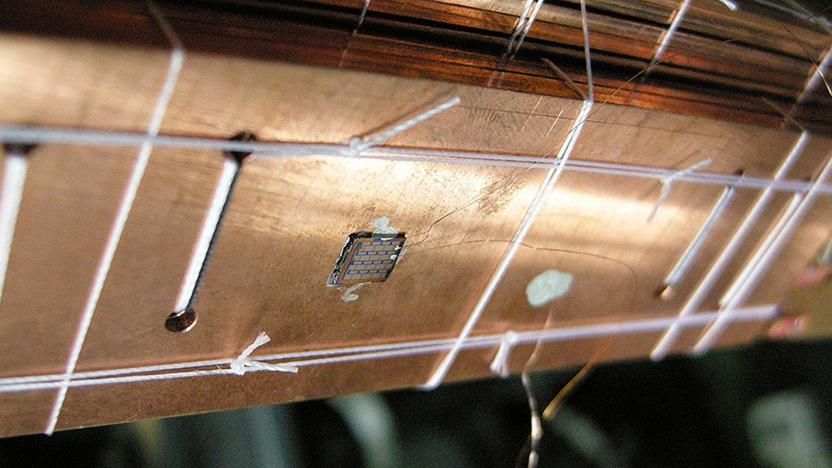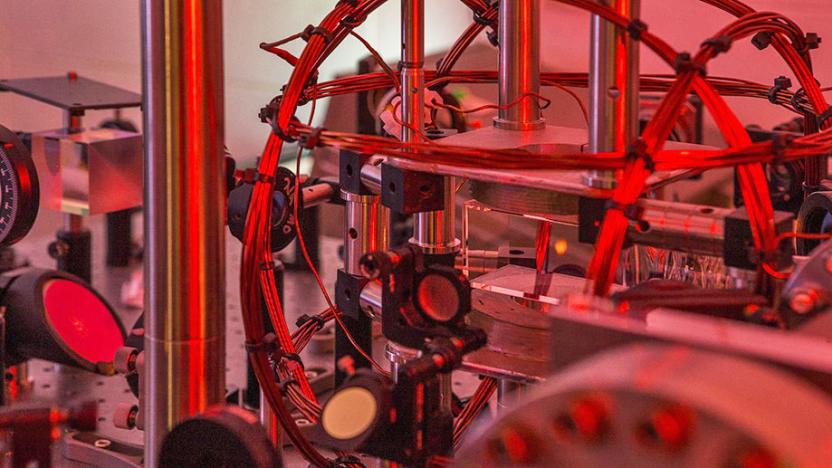absolutezero
Latest

World's coolest chip runs at near absolute zero
How do you find out what happens to physics near absolute zero (aka 0 kelvin), the temperature where particle motion virtually stops? Scientists at the University of Basel might have just the device to do it. They've developed a nanoelectronics chip that they can successfully cool to a record-setting, bitterly cold 2.8 millikelvin. The trick involved a clever use of magnetic fields to eliminate virtually all sources of heat.

AI can recreate Nobel-Prize winning experiments
We've seen how artificial intelligence has made quantum experimentation easier, and now machine learning is being implemented in other areas of scientific experimentation. A team of researchers from the Australian National University, University of Adelaide and the University of South Wales Australian Defence Force Academy (phew) used an algorithm to recreate a Nobel Prize-winning experiment that created a Bose-Einstein condensate. In simpler terms, the physicists made ultra-cold gas (1 microkelvin, less than "a billionth of a degree above absolute zero"), and then let the AI take over the rest of the experiment.

Antimatter gets trapped for 15 minutes by CERN scientists, escapes unharmed
Antimatter particles are elusive little critters that tend to disappear moments after being spotted. Unless, it turns out, you trap them in a "magnetic bottle" and turn the temperature right down to almost absolute zero. CERN scientists have now used this technique to hold 300 antihydrogen particles for up to 1,000 seconds, relaxing them into their ground (stationary) state to make them easier to study. This opens the way for further research later in the year, when captured particles will be prodded with lasers and microwaves to see if they obey the same laws of physics that govern everything else in our universe. After all this effort, we're quietly hoping they don't. [Thanks, Howard]

Large Hadron Collider staying cool at just a hair above absolute zero temperatures
Ah, Large Hadron Collider, our old frienemy, how close is thy doomsday clock now? Closer than it was last week, naturally, especially now that the temperature in each of its eight sectors has been dropped to 1.9 Kelvin, or -271 degrees Celsius / -456 Fahrenheit, depending on your equivalent measurement of choice. While pretty much lethal for humans, that's still twice as warm as the Boomerang Nebula some 5,000 light years away from our fair planet, making it a veritable vacation spot for those carnivorous inhabitants of the Centaurus constellation (not that they'd really want to make that big of a trek without some sort of pre-planned hotel accommodations, but we digress). The chill is all a part of the massive science experiment's ramp up to its second half of November relaunch -- assuming the personification of Higgs boson doesn't pop in via its proverbial TARDIS equivalent wearing a cape and carrying an anti-LHC particle gun, that is.

IBM, GIT overclock chip to 500GHz
If you were wowed by those Japanese modders who overclocked their stock CPU to 7GHz, wait till you hear about IBM's latest foray into the world of ultra-fast computing: together with researchers from the digital camera-hating Georgia Institute of Technology, Big Blue has managed to overclock a chip to an unheard of 500GHz. Granted, the model they used already had a blistering native clock speed of 350GHz to begin with, but we're still floored that you could actually coax a small silicon wafer into operating at an incredible half-terahertz. As you probably suspected, there's no way to achieve speeds like this at room temperature, so the team froze their high-performance silicon-germanium chip to a super-chilly negative 451-degrees Fahrenheit, which is just eight degrees above absolute zero. Unfortunately, after learning about this breakthrough, electronics giant Sony apparently felt that consumers would no longer be impressed with their much-hyped Cell processor, so they've once again delayed the PS3 until IBM can make the liquid helium-cooled CPUs suitable for mass production . Expect the 500GHz PS3 to hit stores sometime in 2011.[Thanks, bento-san]


